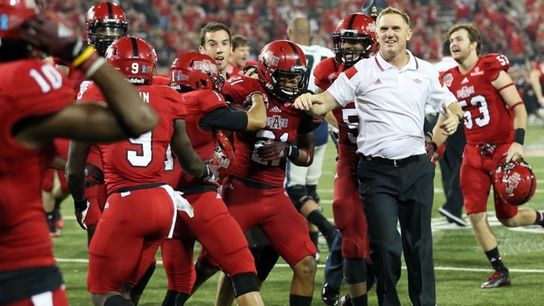Back in 2005 Blake Anderson had to make a life altering decision, according a recent piece in The State; continue in the coaching profession and watch his marriage and family life crumble, or walk away from coaching and focus on his life off the field.
It's a decision that hundreds of coaching face every year.
Anderson walked into the football offices at Middle Tennessee State the morning after being confronted with that decision and submitted his resignation, walking away from life as a college football coach.
"That moment in my life, at my worst, has really allowed me to grow and become better to the people around me. I care more about taking care of them than I do taking care of me. They don't work for me; we work together." the first year Arkansas State head coach explained.
After resigning at MTSU, Anderson spent the next two seasons away from coaching altogether, selling insurance for his father's business in Texas and reconnecting with his wife, daughter, and two sons. It was those two years away from football that transformed his approach to coaching.
When the 2007 season rolled around, Anderson got back into coaching at Louisiana-Lafayette with the blessing of his family and the promise that he wouldn't go back to his old coaching ways. This time around there would be a healthy balance of football, family and faith.
Back in December of 2013, Anderson was announced as the fifth head coach in five seasons at Arkansas State. it marked his first opportunity to run his own program, and his approach to running the entire program reflects the changes he vowed to make.
For example, The State points out that staff meetings don't start until 8:15 so that his assistants can take their kids to school. Assistants get over 5 weeks of vacation during the summer, and are not allowed to work weekends during the spring. Also among the changes are two days a week (Wednesdays and Thursdays) when coaches leave the facility as soon as the final whistle blows at practice.
In Jonesboro, Anderson is doing things his way, but really had to face some harsh realities before being given the chance to run his own program, his way.
"If it means we don't get it done, and they fire me, then you know what, then my way didn't work this time." he explained.
"It doesn't mean it won't work somewhere else. To me, it's worth the risk."
